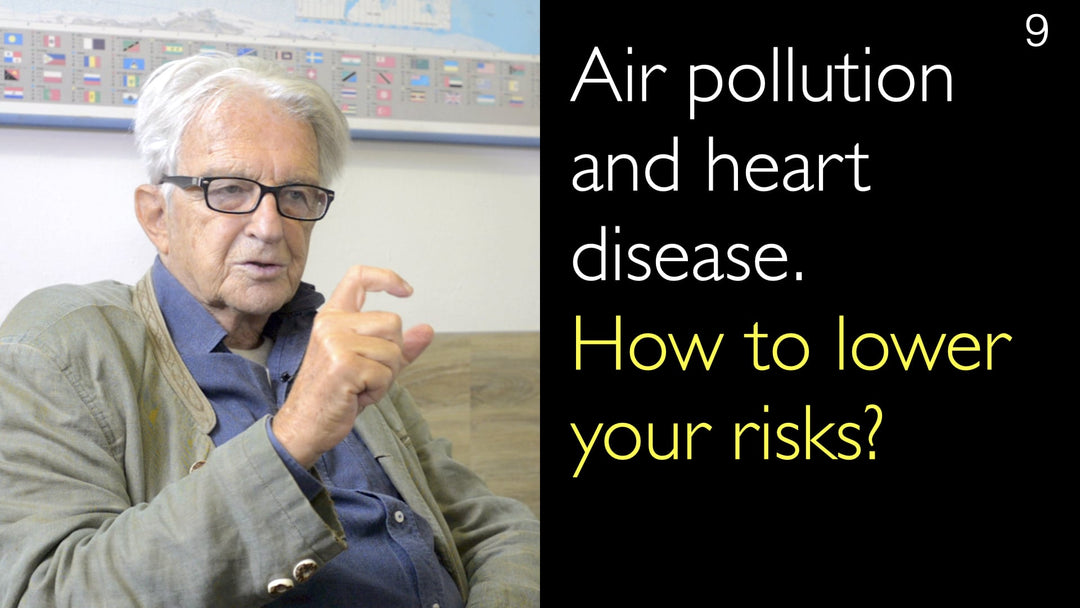Leading expert in liver diseases, Dr. Sanjiv Chopra, MD, explains how regular coffee consumption significantly reduces the risk of chronic liver disease, liver cancer, type 2 diabetes, and heart disease. Coffee's health benefits are linked to lower inflammation markers, longer telomeres for cellular aging, and protection against several common cancers. Dr. Chopra recommends drinking two to six cups of black coffee daily, preferably regular over decaf, and avoiding artificial sweeteners to maximize these profound health advantages.
Coffee Health Benefits: Reducing Liver Disease, Cancer, and Diabetes Risk
Jump To Section
- Liver Enzyme Protection and Disease Prevention
- Cancer Risk Reduction from Coffee
- Neurological and Diabetes Benefits
- Inflammation and Telomere Lengthening Mechanisms
- Optimal Coffee Consumption Guidelines
- Artificial Sweetener Health Warning
- Gut Microbiome Impact of Substitutes
Liver Enzyme Protection and Disease Prevention
Dr. Sanjiv Chopra, MD, a leading liver specialist, describes the initial observation that sparked interest in coffee's health benefits. "People who drank coffee had lower levels of liver enzymes, ALT and AST," Dr. Sanjiv Chopra, MD, explains. Elevated levels of these enzymes almost always indicate liver disease, making this finding highly significant.
Further research revealed that coffee drinkers also had less hepatic fibrosis and scar tissue in the liver. Dr. Sanjiv Chopra, MD, notes a landmark study showing that "people who drank two cups of regular coffee a day had a 50% reduction in hospitalization and mortality from chronic liver disease." This protection extends to cirrhosis, where scar tissue completely distorts the liver's architecture.
Cancer Risk Reduction from Coffee
Coffee consumption demonstrates remarkable protective effects against multiple cancers. Dr. Sanjiv Chopra, MD, emphasizes that primary liver cancer, now the third leading cause of cancer mortality globally, shows a "40% reduction in primary liver cancer mortality" among those drinking two cups of regular coffee daily.
Beyond liver cancer, Dr. Sanjiv Chopra, MD, identifies four additional cancers with reduced incidence among coffee drinkers: metastatic prostate cancer, colon cancer, skin cancer (including malignant melanoma), and endometrial cancer. This multi-cancer protective effect makes coffee a potentially significant dietary factor in cancer prevention strategies.
Neurological and Diabetes Benefits
The health benefits of coffee extend to neurological conditions and metabolic health. Dr. Chopra reports that coffee drinkers experience "low risk of Parkinson's disease, low risk of cognitive decline and early dementia." These neurological protections complement the beverage's physical health advantages.
For type 2 diabetes, Dr. Sanjiv Chopra, MD, notes impressive risk reduction: "One has to drink six cups of coffee, regular or decaf. Then there is a 40 to 54% reduction in risk of developing Type 2 diabetes." For those already diagnosed, "drinking two cups of coffee daily provides a 30% reduction in cardiovascular mortality."
Inflammation and Telomere Lengthening Mechanisms
The mechanisms behind coffee's health benefits involve reducing systemic inflammation. Dr. Sanjiv Chopra, MD, explains that "coffee drinkers have low levels of CRP, low levels of TNF alpha," both markers of inflammation. Since chronic inflammation underpins many conditions, including cancer, this anti-inflammatory effect provides a plausible explanation for coffee's broad protective benefits.
A particularly exciting discovery involves telomeres, the protective caps on chromosomes. Dr. Sanjiv Chopra, MD, references research showing "people who drink coffee have longer telomeres." Shortened telomeres are linked to accelerated cellular aging, while longer telomeres are associated with longevity. Nobel Prize-winning research by Elizabeth Blackburn established this connection, placing coffee alongside exercise, Mediterranean diet, and meditation as telomere-lengthening practices.
Optimal Coffee Consumption Guidelines
Dr. Anton Titov, MD, asks about practical consumption recommendations, prompting detailed guidance from Dr. Chopra. Based on the research, benefits begin at two cups daily for liver protection and increase with consumption for conditions like diabetes, where six cups provide maximum benefit.
Dr. Sanjiv Chopra, MD, advises: "Drink regular coffee if you can. It has more benefits than decaf." The preparation method also matters significantly for maximizing health outcomes while avoiding potential drawbacks from additives.
Artificial Sweetener Health Warning
Dr. Chopra provides crucial advice on what not to add to coffee. "Don't add cream or sugar substitutes," he warns. While he personally prefers black coffee for simplicity and temperature consistency, he acknowledges some may want sweetness but emphasizes avoiding artificial options.
Dr. Sanjiv Chopra, MD, strongly cautions against artificial sweeteners, which research shows can produce "worse glucose intolerance" despite their low-calorie appeal. This advice reflects evolving understanding of how non-nutritive sweeteners affect metabolic health.
Gut Microbiome Impact of Substitutes
The warning against artificial sweeteners connects to one of medicine's hottest topics: the gut microbiome. Dr. Sanjiv Chopra, MD, explains these substitutes "change the microbiome in the intestines," potentially causing more harm than regular sugar. He describes the microbiome as "the second human genome, the inner bacterial rainforest," noting this collection of trillions of bacteria weighing approximately three pounds represents a newly discovered organ system.
Dr. Sanjiv Chopra, MD, offers a practical alternative: "If you want to have a Coca Cola, have a Coca Cola. Maybe have one third, savor it, enjoy it, rather than have a Diet Coke." This approach prioritizes minimal consumption of real sugar over regular consumption of artificial substitutes that may disrupt gut health and metabolic function.
Full Transcript
Dr. Anton Titov, MD: Protection of liver, reduction in diabetes, inflammation, cancer, aging. Leading liver diseases expert from Boston reviews benefits of drinking coffee. Coffee can reduce liver enzyme levels (a good thing), increase telomere length (longer life?), and reduce risks of diabetes and heart disease. Get a cup of coffee and see Dr. Sanjiv Chopra discuss coffee’s health effects.
Dr. Anton Titov, MD: Dr. Chopra, you spoke about and wrote in your books that coffee is one of the most important protectors of health. Could you please expand on your idea?
Dr. Sanjiv Chopra, MD: That's a great question! As you mentioned, I'm a liver expert. I got very intrigued about 25 years ago when I read that coffee drinkers have low levels of liver enzymes in the blood.
When we go see our primary care physician once a year, they do a battery of blood tests and amongst them they test for two liver enzymes, ALT and AST. This was an observation that people who drank coffee had lower levels of ALT and AST. When somebody has elevated levels, it is almost always indicative of liver disease.
Dr. Anton Titov, MD: This is intriguing. But what does it mean? Maybe there is something in coffee that interferes with the assay, so you get lower levels.
Dr. Sanjiv Chopra, MD: But then studies came out that coffee drinkers have less hepatic fibrosis. Coffee drinkers have less scar tissue in the liver. Sometimes there is lots of scar tissue in the liver. Scars totally distort the liver architecture, with islands of liver cells totally surrounded by scar tissue, fibrosis. We call it cirrhosis.
Coffee drinkers had low levels of liver enzymes; they had less fibrosis. Then a study in Journal of Gastroenterology showed that people who drank two cups of regular coffee a day had a 50% reduction in hospitalization and mortality from chronic liver disease.
It turns out that primary liver cancer, cancer rising in the liver, is now the third leading cause of cancer mortality in the world. Multiple studies and a meta-analysis have shown that people who drink two cups of regular coffee have a 40% reduction in primary liver cancer mortality.
Low liver enzymes, less scarring, less fibrosis, less hospitalization, less mortality, less liver cancer. It turns out that coffee drinkers also have a lower risk of four other common cancers. They are metastatic prostate cancer, colon cancer, skin cancer (including malignant melanoma, a very deadly skin cancer), and endometrial cancer.
Five cancers—people who drink coffee have a lower incidence. Low risk of Parkinson's disease, low risk of cognitive decline and early dementia, lower risk of Type 2 diabetes. For type 2 diabetes, one has to drink six cups of coffee, regular or decaf. Then there is a 40 to 54% reduction in risk of developing Type 2 diabetes.
When somebody already has type 2 diabetes and they drink two cups of coffee a day, regular or decaf, there is a 30% reduction in cardiovascular mortality. Pretty impressive!
Dr. Anton Titov, MD: There are mechanistic explanations: coffee drinkers have low levels of CRP, low levels of TNF alpha. Coffee reduces inflammation? Yes, that may be the mechanism how coffee decreases many conditions, the risk of developing them or even cancer. This we now know is linked with inflammation. C-Reactive Protein is a sensitive marker for inflammation.
Dr. Sanjiv Chopra, MD: True, so true! A study appeared in the New England Journal of Medicine about four years ago. That day I got about a hundred plus emails from colleagues around the country. "Sanjiv, you have been talking about coffee all these years and its potential health benefits. You are vindicated!"
The study in the New England Journal of Medicine said this: "Men and women who drink coffee have lower total and cause-specific mortality." Then about six or eight months ago, an article in one of the nutrition journals showed that people who drink coffee have longer telomeres.
Telomeres were described by Elizabeth Blackburn, an Australian scientist. She got the Nobel Prize in Medicine or Physiology in 2009 with two other colleagues. Shortened telomeres are linked with accelerated cellular aging.
Dr. Anton Titov, MD: Who has shortened telomeres?
Dr. Sanjiv Chopra, MD: Mothers of chronically disabled children, caregivers of people with Alzheimer’s disease. Who has longer telomeres? By inference they may live longer. We think they live longer. People who exercise, people on the Mediterranean diet, people who meditate. Then the recent study showed that people who drink coffee have longer telomeres.
Dr. Anton Titov, MD: Does it matter which coffee to drink? How much coffee one should drink? What is the frequency of coffee consumption for health benefits?
Dr. Sanjiv Chopra, MD: It is a great question! The studies have simply asked: "Do you drink coffee? Yes or no? If you drink coffee, how many cups do you drink? What is the size of the cup? Do you drink regular or decaf?"
My take on it is this. Drink regular coffee if you can. It has more benefits than decaf. Don't add cream or sugar substitutes. I like to drink it black, make it simple. I don't have to worry about sugar and Splenda.
Do I put milk? Is milk cold? And it is going to make my coffee cold. I drink black coffee. Sometimes somebody wants to sweeten it, add sugar. Don't use artificial substitutes. Artificial sugars are turning out to produce worse glucose intolerance, because it changes the microbiome in the intestines.
This is one of the hottest topics in medicine, gut microbiome. Microbiome has been called "the second human genome, the inner bacterial rainforest." There are trillions of bacteria in our intestines. In aggregate their weight is 3 pounds. It is a newly discovered organ!
If you want to have a Coca Cola, have a Coca Cola. Maybe have one third, savor it, enjoy it, rather than have a Diet Coke. This has only one calorie but has many injurious health effects.







